new posts in all blogs
Viewing: Blog Posts Tagged with: Palabra Pura, Most Recent at Top [Help]
Results 1 - 9 of 9
How to use this Page
You are viewing the most recent posts tagged with the words: Palabra Pura in the JacketFlap blog reader. What is a tag? Think of a tag as a keyword or category label. Tags can both help you find posts on JacketFlap.com as well as provide an easy way for you to "remember" and classify posts for later recall. Try adding a tag yourself by clicking "Add a tag" below a post's header. Scroll down through the list of Recent Posts in the left column and click on a post title that sounds interesting. You can view all posts from a specific blog by clicking the Blog name in the right column, or you can click a 'More Posts from this Blog' link in any individual post.

By: Lisa Alvarado,
on 2/13/2008
Blog:
La Bloga
(
Login to Add to MyJacketFlap)
JacketFlap tags:
Uof AZ Press,
poetry,
culture,
anthology,
Palabra Pura,
Latino,
Latina,
Francisco Aragón,
spoken word,
performance,
Add a tag
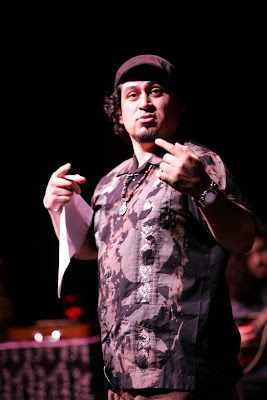
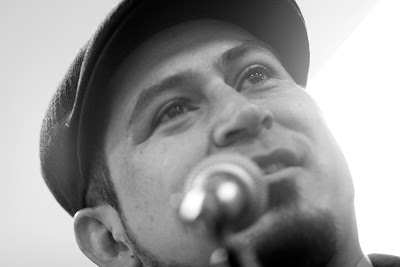
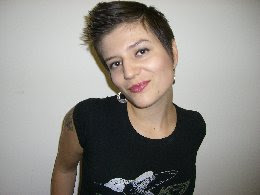 Palabra Pura, Chicago's home for cutting edge, innovative Latino poetry is evolving in exciting ways, with its 2008 calendar of stellar talent solidly in place. While still basing itself at the California Clipper, Palabra Pura will begin to also hold events at Latino venues throughout the city. This month, join nationally know poet and performer, Tim Z. Hernandez and Chicago actor, poet and activist, Stephanie Gentry-Fernandez.
Palabra Pura, Chicago's home for cutting edge, innovative Latino poetry is evolving in exciting ways, with its 2008 calendar of stellar talent solidly in place. While still basing itself at the California Clipper, Palabra Pura will begin to also hold events at Latino venues throughout the city. This month, join nationally know poet and performer, Tim Z. Hernandez and Chicago actor, poet and activist, Stephanie Gentry-Fernandez.
Wednesday,
February 20th. 8 pm Decima Musa Restaurant
1901 S. Loomis, St. Chicago, IL
About the poets: Tim Z. Hernandez is a writer and performer originally from central California. His writing and performance texts have appeared in numerous anthologies and publications, and his performances featured at prestigious venues across the nation, including: LA’s Getty Center Museum, The Loft Literary Center in Minneapolis, Stanford University, and the Jack Kerouac School of Disembodied Poetics. In the past, he has been commissioned by major groups such as the United Way of Greater Los Angeles to write and perform his original plays on issues of homelessness and poverty. Currently, he’s working in tandem with Poets & Writers Inc, and California Center for the Book, offering bilingual poetry workshops across the United States.
He is the recipient of several notable awards including: 2006 American Book Award for his debut collection of poetry Skin Tax, San Francisco Foundation’s James Duval Phelan Award, a Best Solo Production Award for his one man show, Diaries of a Macho, and the Zora Neal Hurston Award for writers of color dedicated to their communities. In the interest of artistic development, Hernandez’s focus is on excavating stories that bring to light the limitless potential of the human capacity, stories of physical and metaphysical journeys, with special attention to marginalized populations. When he’s not busy teaching creative writing and performance, he’s touring the country, collaborating with his word-music-theater collective, Brown Lotus, and offering workshops to Universities, arts groups, cultural centers, foundations, and libraries. Tim holds a B.A. in Writing & Literature from Naropa University, the first accredited Buddhist School in the west.
Currently, he resides in Boulder, Colorado with his wife and two daughters.
What People Are Saying About Tim Z. Hernandez
"Tim Hernandez is one of the finest and most exciting new talents to emerge from the new generation of Latino writers!”- Bloomsbury Review, Ray Gonzalez
“It’s too reductionistic to call Tim Hernandez a performance poet…though his voice and rhythms surely benefit from the energy behind a microphone, the complexity of his ideas merit the slower pace study made possible through the written pages of Skin Tax.” - El Paso Times Book Review Rigoberto Gonzalez
“Tim Hernandez is a dynamic force as a writer and performer!” - Gary Soto Author of, Nickel & Dime
“Hernandez is a poet of obvious and quickly realized skills…his images are brilliant, sharp, and concise, his language spare yet rich. Poetry of the here and now, Brown Lotus is the kind of task that should have been undertaken long ago!” -Amiri Baraka, Author of, Transbluesency
“I like Tim’s boldness, his willingness to be raw and trust the content of the poem to make it real and legitimate, his words sizzle and spark with excitement, targeting with a relentless passion his desire to express what he is trying to convey.” - Jimmy Santiago Baca, Author of, A Place To Stand
“[Tim Hernandez] …represents a whole new direction in the Latino literary world!” - Juan Felipe Herrera, Author of, Notebooks of a Chile Verde Smuggler, and 185 Reasons Mexicans Can't Cross the Border
“[Skin Tax] is poetry not for delicate sensibilities, unafraid, it dares to stand out and speak of subjects commonly eschewed by other poets.” - Midwest Book Review
xxxxxxxxxxxxxxxxxxxxxxxxxxxxxxxxxxxxxxxxxxxxxxxxxxxx
Stephanie Gentry-Fernandez is a poet and performer from the South Side whose male side you may recognize from Teatro Luna's recent production of "Machos." She has a deep personal commitment to anti-oppression work and currently works at the Broadway Youth Center.
xxxxxxxxxxxxxxxxxxxxxxxxxxxxxxxxxxxxxxxxxxxxxxxxxxxx
Letras Latinas, The Wind Shifts and a National Tour!
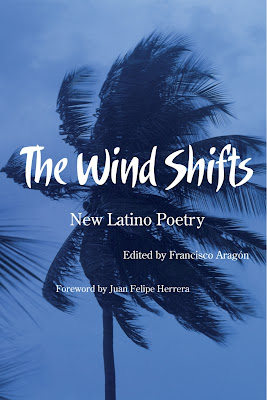
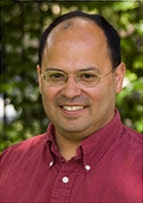
“In the hour of extremes, long live these brave wordsmiths of American letters.”
— Sandra Cisneros
February 23, 2008, Palm Beach, FL
@The Society of the Four Arts
Eduardo C. Corral
Kevin A. González
Sheryl Luna
May 31, 2008, Minneapolis, MN
@The Loft Literary Center
Urayoán Noel
Carl Marcum
Adela Najarro
Emmy Pérez
September 25, 2008, Seattle, WA
@Richard Hugo House
Richard Blanco
María Meléndez
Steven Cordova
Deborah Parédez
“The Wind Shifts: New Latino Poetry ON TOUR” is supported in part by the Ford Foundation, JP Morgan Chase, the Andy Warhol Foundation for the Visual Arts and Southwest Airlines through a grant from the NALAC Fund for the Arts.
Letras Latinas is the literary program of the Institute for Latino Studies at the University of Notre Dame. The Guild Complex is a community-based literary organization in Chicago.
The Wind Shifts gathers, for the first time, works by emerging Latino and Latina poets in the twenty-first century. Here readers will discover 25 new and vital voices including Naomi Ayala, Richard <!--- inline quote --->
Blanco, David Dominguez, Gina Franco, Sheryl Luna, and Urayoán Noel.
The writers included in this volume have published poetry in well-regarded literary magazines. Some have published chapbooks or first collections, but none had published more than one book at the time of selection. This results in a freshness that energizes the enterprise. Certainly there is poetry here that is political, but this is not a polemical book; it is a poetry book. While conscious of their roots, the artists are equally conscious of living in the contemporary world—fully engaged with the possibilities of subject and language. The variety is tantalizing.
There are sonnets and a sestina; poems about traveling and living overseas; poems rooted in the natural world and poems embedded in suburbia; poems nourished by life on the U.S.–Mexico border and poems electrified by living in Chicago or Los Angeles or San Francisco or New York City. Some of the poetry is traditional; some is avant-garde; some is informed by traditional poetry in Spanish; some follows English forms that are hundreds of years old. There are love poems, spells that defy logic, flashes of hope, and moments of loss. In short, this is the rich and varied poetry of young, talented North American Latinos and Latinas.
xxxxxxxxxxxxxxxxxxxxxxxxxxxxxxx
ABOUT THE ANTHOLOGY
“In the hour of extremes, long live these brave wordsmiths of American letters. Hallowed be the poets when the news is diffused in the name of susto. Viva the citizens of truth. Hallelujah the devotees of language, the languished souls enamored of the syllable.” —Sandra Cisneros, author of The House on Mango Street
“The poets in this anthology seem as though they just want to write poems, not specifically Latino poems. They are much too cross-pollinated for that—we all are, if truth be told—which is what makes that synthesis possible, the marvelous marbling at the core." —Aleida Rodríguez, author of Garden of Exile
“Here it is again, the shock of the new, eager as always to unsettle the present, to reconfigure the past while redefining the future. Ah, the impetus of the young!” —Ilan Stavans
“At last, a 21st century anthology that confirms the breadth and depth and diversity of contemporary Latino/a writing. The poems in this collection defy any stereotypes about ‘Latino poetry’ and testify to the rich variousness of the American Latino/a experience. Readers—rejoice!" —Valerie Martínez, author of Absence, Luminescent and World to World
“With jagged beauty, this collection expands our consciousness—documents and honors lives often absent from American poetry. In these pages, we join souls in struggle, almas luchando." —Pat Mora
"The title of the ravishing collection of poems by 25 Latino and Latina writers can be read as an allusion to change and to the fact that poetry is a force, like wind, that knows know borders. Whether inspired by family, love, despair, poems by Rilke, or a painting by Jose Clemente Orozco, the poets gathered here are involved in the infinite possibilities of language."
— Booklist
"This is a compelling and exhilarating addition to Latino letters."� El Paso Times
Lisa Alvarado

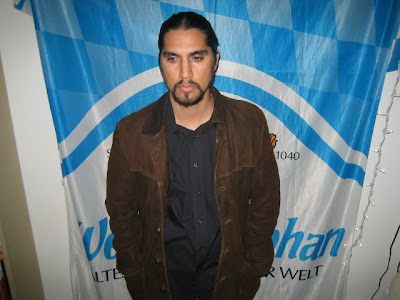
ariel robello and Juan Manuel Sánchez
Gente! Exciting poetry news here in Chicago...Palabra Pura kicks off their third year January 16th, 8:30 PM, at their usual local, California Clipper, 1002 N California Ave.
For those of you unfamiliar with this superb salon of Latino poetry, here's an interview I did with one of its founders, La Bloga friend and excellent poet in his own right, Francisco Aragón. Believe me, a Palabra Pura experience is NOT to be missed, and it's been my pleasure to be part of the local steering committee, especially in the company of the likes of Ellen Placey Wadey, Mike Puican, Mary Hawley, y La Divina, Johanny Vazquez. Below is the first line up of what promises to be a stellar year of local Chicago poets paired with poets who've made their mark on the national scene.
********************************************************
In her debut collection of poems, My Sweet Unconditional, ariel robello meets us at the horizon, where worlds blend in the blush of sunrise and sunset, where land meets sea, air – earth, and where man and machine interrupt the natural ebb and flow of life. Unapologetic, she declares her faith in a love that defies borders and with each poem she weds herself to a belief that unconditional love can still be found in the cracks of a urban sidewalk, dancing above puffing smoke stacks, behind a guerrilla’s mask, in the worn paint brush of an island love, blundering below a street lamp in Ensenada, spelled out in daisies on a Veteran’s tombstone, in the stitch of a huipil and most importantly—deep inside one’s own reflection. With language as radiant and dangerous as broken glass ariel robello cuts away at the political dogma and superficial beauty of a world unhinged to reveal a bloody but dignified glimpse of love in the hands of a New World survivor. Having earned her chops on both the stage and the page, ariel robello represents a generation of poets as concerned with performance as they are with line breaks. ariel robello received a PEN West Rosenthal Emerging Voices Fellowship in 2002 and published her first collection of poems, My Sweet Unconditional in 2005 with Tia Chucha Press. The inspiration for her poetry stems from her work as a poet-in-residence and mentor to teens, advocate for immigrants’ rights, and teacher of English in schools, sweatshops, juvenile detention centers, and most recently at the community college where she now lives with her hijito in Tampa, Florida.
“Effortlessly, swimmingly, yet every line a ‘florescent ember’, seething and praying, these poems mark the debut of a powerful woman of letters; young yet wise, weary yet hopeful. ariel robello is the revolution in verse we’ve been waiting for – the spoken unspoken, the dreaded effervescence of truth conspiring with our souls. Chicana voices have always pushed deeper into the emotional terrain of conscience and witness, ‘My Sweet Unconditional’ does what poetry collections should always do – pull us into a universe so familiar yet frighteningly unknown with poems that awaken us to the political and personal traumas of our times, yet sweetened by the beauty of word and verse.
—Luis J. Rodriguez is an award-winning poet, journalist, memoirist, children’s book writer, essayist and fiction writer. He is author of the critically acclaimed “Always Running: La Vida Loca, Gang Days in L.A.”
"Ariel Robello's My Sweet Unconditional is never insincere or sentimental. This first collection of point-blank narratives of the heart never misses. Playful and reasoned, witty and serious, My Sweet Unconditional's insinuation beckons and disarms. Ariel Robello's voice is one of a kind."—Yusef Komunyakaa, Pulitzer Prize-winning poet.
"Poetry Lover, beware the fire-and-ice urban joys of Ariel Robello! These are brutally savvy and deliciously vicious paeans to life, relentless in their celebrations of love, sacrifice and sex--and once beheld by the eyeheart, humbles rescues redeems."
—Wanda Coleman, poet, Los Angeles
"Ariel Robello has crafted remarkable poems that demand no less than a pure appreciation of art from you, even as they break your heart. There is nothing easy here: the music is grafted from a painful if illuminating life, but they shimmer with a rage that is transformative.
A voice to watch for." —Chris Abani, author of GraceLand and Dog Woman.
www.nupress.northwestern.edu
Paper -1-882688-29-5 $13.95
Available for sale on www.amazon.com
********************************************************
Juan Manuel Sánchez was born and raised on the US side of the San Diego/Tijuana border. He holds an MA in Literature from UC San Diego and is currently in the final throes of his MFA at the University of Illinois at Urbana-Champaign. He has worked as an assistant editor for Ninth Letter, has lectured at various universities and is now Lecturer of Spanish at the University of Chicago. His work is forthcoming in Pembroke and in the anthology Junta: Avant-Garde Latino/a Writing.
LisaAlvarado
By: Eleanor Tylbor,
on 1/3/2008
Blog:
NOTE TO MYSELF
(
Login to Add to MyJacketFlap)
JacketFlap tags:
in the news,
current events,
news,
life,
miscellaneous,
culture,
etcetera,
clams,
earth cam,
mussel watch,
musselcam,
mussels,
mussel watching,
P.E.I. Canada,
molluscs,
earth cam,
mussel watch,
clams,
musselcam,
mussels,
mussel watching,
P.E.I. Canada,
molluscs,
Add a tag
NOTE TO SELF: MUSSELS ARE NOT THE MOST VISUAL MULLOSKS
One thing for sure is that anybody hoping for some exciting viewing on MusselCam will be disappointed, but then that's the way Mother Nature works. Unbelievable as it may seem MusselCam located in Prince Edward Island, Canada, was named amongst the top 25 most interesting webcams in the world. Hey - now that's an accomplishment!
That lone blue mussel is the only one of two Canadian entries to crack EarthCam's list. A webcam tracking the lighthouse at scenic Peggy's Cove in Nova Scotia
(www.peggyscovewebcam.ca/live) is also on the webcam network's list of favourites.
For the uninitiated and according to Wikipedia, "the common name mussel is used for members of several different families of clams or bivalve molluscs, from both saltwater and freshwater habitats."
Visually they aren't anything to look at being round and...round.
The message on the web page says it all: "mussels grow very, very slowly. Please check back often."
Garner Quain, the co-owner of Flex Mussels, which has locations in Charlottetown and Summerside, was surprised to hear his camera made the list.
"I didn't ever think that it would make any kind of Top 10 list, other than the fact that it's so, kind of, notoriously boring," said Quain."There's a few other ones on the internet that are sort of old favourites that have kind of always been running, so it was really kind of an homage to those, so to be included among them is a nice little honour."
Quain said MusselCam gets more than 1,000 hits a day.
Anyway, if you've got a lot of time - and patience - drop by the musselcam site here:
http://www.flexmussels.com/musselcam.html
Let us know if anything exciting happens. Yawn...
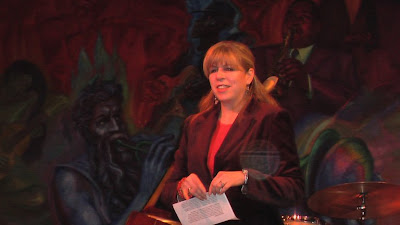
Johanny Vázquez Paz was born and raised in San Juan, Puerto Rico. She holds a Master of Arts in Hispanic Studies from the University of Illinois at Chicago and a Bachelor of Arts in Sociology from Indiana State University. Her book Streetwise Poems/Poemas Callejeros was recently published by Mayapple Press (Michigan, 2007). She co-edited the anthology Between the Heart and the Land / Entre el corazón y la tierra: Latina Poets in the Midwest (MARCH/Abrazo Press, 2001) and was included in the compilation Poetas sin tregua (Spain, 2006) of Puerto Rican poets from the 80's generation.
Some of her poems appeared in the anthology Más allá de las fronteras (Ediciones Nuevo Espacio, New Jersey, 2004), and she was published in the collection Carpetas de Luz after winning the Voces Selectas 2000 poetry contest of Luz Bilingual Publishing. Johanny has been published in the literary magazines VOCES Journal (Univ. of California), El Centro Journal of the Center for Puerto Rican Studies (Hunter College, N.Y.), Beyond Borders (De Paul Univ.) and Yagrumal (Puerto Rico), among others. She currently teaches Spanish at Harold Washington College in Chicago, IL.
Johanny Vázquez Paz nació y se crió en San Juan, Puerto Rico. Posee una maestría en Estudios Hispánicos de la Universidad de Illinois en Chicago y un bachillerato en Sociología de la Universidad del Estado de Indiana. Su libro Streetwise Poems/Poemas Callejeros fue recientemente publicado por Mayapple Press (Michigan, 2007). Co-editó la antología Between the Heart and the Land / Entre el corazón y la tierra: Latina Poets in the Midwest (MARCH/Abrazo Press, 2001), y fue incluida en el libro Poetas sin tregua-Compilación de poetas puertorriqueñas de la generación del 80 (España, 2006).
Además, algunos de sus poemas aparecen en la antología Más allá de las fronteras (Ediciones Nuevo Espacio, New Jersey, 2004), y fue publicada en la colección Carpetas de Luz después de ganar el certamen Voces Selectas 2000 de Luz Bilingual Publishing. Johanny ha sido publicada en las revistas: VOCES Journal (Univ. of California), El Centro Journal of the Center for Puerto Rican Studies (Hunter College, N.Y.), Beyond Borders (De Paul Univ.) y Yagrumal (Puerto Rico), entre otras. Actualmente es profesora de español en Harold Washington College en Chicago, IL.
Aside from the obvious descriptors in her bio, Johanny Vázquez Paz is quite simply a force of nature. She's warm like earth, clear and bracing as running water, and bright as the canopy of morning sky. She's also a Chicago literary fixture, and it's been our very good luck indeed that she's been the host of Palabra Pura since its inception. It's Johanny's voice you hear each month at California Clipper welcoming you, teasing you, coaxing you to relax and enjoy. With her inimitable presence, the bar becomes nuestra joint, an opportunity to savor. And the experience is made richer by her sharing her own poetry, setting out the first course in that feast of words that is a Palabra Pura reading.
There is so much to appreciate. She is also a poet of what I like to consider working class sensibilities -- direct, honest, but full of profound feeling, true feeling. In the 2007, the release of Streetwise Poems/Poemas Callejeros, Johanny shows us how deeply the streets run in her veins, the public and private ways her heart holds the love of family and their stories. No matter how much her work is anchored in an urban base, she is tethered always to la isla, to Puerto Rico and its sorrow and strength, always writing from an solid place of female dignity. Take a moment and read for yourself.
Daughter of the City
I feel the streets in my veins
avenues
highways
alleyways
boulevards
roads without stop signs or lights or signals
live within me
circling the bewildering labyrinths of my being,
noises echo loudly at every corner,
each step banging like a hand on a drum,
horns demanding that others move out of the way,
shots crying farewell to their reasons for hate,
screams hiding by the anger of a barking dog.
Daughter of the city
citizen of hell
resident of purgatory.
I am a skyscraper inhabited by urgency,
a map of nameless streets,
only the suicidal wind dares to speed
past the danger signs of my curves.
Hours merge without boundaries into dawn;
my anxieties open for business twenty-four hours a day
without ever finding peace and quiet
inside the insistent beating of my sleepwalking heart.
Letter to My Mother from Chicago
Don’t worry about me, madrecita,
everything seems fine in the northlands
and I perfect myself before your eyes.
No problem disturbs me
more than ten hours a day
my health is excellent
without doctors or healthy diets
and there is no one to interrupt
my eternal solitude.
But, don’t be worried, mami,
it’s not as bad as you think.
There are millions of jobs here
that don’t pay well
there is a lot of money
in other people’s accounts
new buildings go up every week
with people trapped behind each door.
If I sound sad maybe it’s because
I miss my homeland, my family and everything,
because the weather chills my bones more each year,
because of the things-to-buy list
that grows like a well fed child,
because of the problems that visit me daily
without an invitation.
I’m fine,
I survive day by day
taking care of things myself,
don’t feel sad, viejita,
life is perfect here.
Reasons of Worth
because I sin in secrecy and silence
keeping before the world
a record of impeccable morality
because I have withstood deserved insults
in the dark corner of rancor and hate
because I could have taken advantage of many men
but I chose solitude over lies and convenience
because I did not prostitute my ideals under the assault
of those whose only ideal is profit
because I was born woman and I bleed
and I am impregnated and I give birth
and I raise and nurture and clean and organize
and I stop bleeding
for these and many other reasons of worth
I deserve fame right now
be it fifteen minutes of praise,
be it an ovation of applause and roses,
be it my image glowing on television,
or my touched-up photo in some important magazine,
be it an honorable mention in some contest
or a trophy with my name engraved,
whatever it may be, but let it be grand...
because
I deserve fame!
I deserve glory!
For more of Johanny's writing, please enjoy the following:
PUBLICATIONS-
Book Poemas Callejeros / Streetwise Poems published by Mayapple Press, Michigan, 2007.
Poem published in the anthology The City Visible: Chicago Poetry for the New Century, Cracked Slab Books, Chicago, 2007.
Poem: Our Revolution.
Poems published in Poetas sin tregua compilation of Puerto Rican poets published in Spain, Ráfagas, 2006.
Poems: Sentada en la arena mirando el mar, Anónimo Lo que queda, Un infierno mío, Fuerza de voluntad, En comunión, Jardinera.
Poems published in Más allá de las fronteras anthology published in New Jersey, USA, Ediciones Nuevo Espacio, 2004.
Poems: Sentada en la arena mirando el mar, Sin debida sepultura.
Article "Café con demasiaaaaada leche: I am a Black Woman Trapped in a White Woman's Body" and poem published in Que Ondee Sola, Northeastern Illinois University-Chicago, IL, March 2003.
Poem: Anhelo africano.
Song lyrics written included in the compact disc Compromiso by Luis Jahn, Chicago, IL, Del Sur Music Publishing, 2003.
Poem: Cada familia.
Co-edited and published poems in Between the Heart and the Land/Entre el corazón y la tierra; Latina Poets in the Midwest anthology published in Chicago, IL, 2001, MARCH/Abrazo Press.
Poems: Liviana / Light Heart (both versions in all indicated), Por un hilo / By a Thread, A la vida / To Life, Morning After.
Poems published in VOCES: A Journal of Chicana/Latina Studies, Volume Three, Number One and Two, University of California, Davis, Spring 2001.
Poems: Con fe / With Faith (both versions in all indicated), Dedicado a Soledad / Dedicated to Solitude, Veinticuatro Horas / Twenty-four Hours, Liviana / Light Heart, Razones de Peso / Reasons of Worth.
Poems published in Centro Journal of the Center for Puerto Rican Studies, in the article "New Rican Voices", Volume XII, Number 1, Hunter College, New York, Fall 2000.
Poems: African Yearning, Carta a mi madre.
Chapbook El filo de la esquina published in the collection Voces Selectas 2000, Carpeta de Poesía Luz Número 4, Luz Bilingual Publishing, Sherman Oaks, CA, 2000.
Poems: Por un hilo, Con fe, Palabras cortas, Juerga de dos, mentira de muchos.
Poems published in ¡Sin linderos ni arrabales, hacia el Siglo XXI!, Segunda Parte. Anthology published in Madrid, Spain, 1999, Calíope Press.
Poems: Liviana, ¡Qué grande estás!
Poems published in El Otro Newspaper, Chicago, IL, December 1999.
Poems: Si alguna vez, Razones de peso.
Poem and short story published in ¡Sin linderos ni arrabales, hacia el Siglo XXI! anthology published in Madrid, Spain, 1999, Calíope Press.
Poem and Short Story: En las mañanas, Con fe.
Poems published in Yagrumal literary magazine, 1999 issue, Peñuelas, Puerto Rico.
Poems: Callejón, Cada familia, ¡Hay que...!, Con fe, Bailando bolero sola, Resolución de fin de año.
Poems published in ¡Y Dios la hizo mujer! anthology published in Madrid, Spain, 1998, Calíope Press.
Poem: Razones de peso.
Poems and article published in La Raza Newspaper, Chicago, IL, July 1999.
Poems: Bailando bolero sola, Callejón.
Interview published in Que Ondee Sola, Northeastern Illinois University-Chicago, IL, March 1999.
Poem published in Que Ondee Sola, Northeastern Illinois University-Chicago, IL, April 1999.
Poem: Our Revolution.
Poems published in Beyond Borders: Más all de las fronteras literary magazine, De Paul University, 1997-98 issue.
Poem: Cada familia.
Poems published in Diminuendo, volume ii, issue 1, Loyola University literary magazine, October 1998. Poem: Alleyway.
Poems published in Karacola literary magazine, 1998, Santiago, Chile.
Poem: Razones de peso
Poems published in Abrapalabra University of Illinois literary magazine, Chicago, IL, 1996
Poem: Anuncio.
Poems published in Fe de erratas, August and November 1993 issues. Poems: Mujer, Débil.
Lisa Alvarado
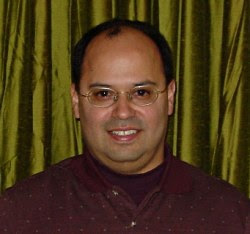 Francisco Aragón
Francisco Aragón
F
or those who are unfamiliar, Palabra Pura features Chicano and Latino poets reading work in Spanish, English and a combination of the two languages. The series offers Chicago’s large Spanish-speaking population, the third largest in the United States, a venue to read their poetry as originally composed and helps audiences learn more about the strong tradition of poetry in Spanish. A special emphasis is placed on poets who have recently published books or won recognition for their work.Palabra Pura is a collaborative project between the Guild Complex, Letra Latinas of the Institute for Latino Studies at the University of Notre Dame, the Rafael Cintron-Ortiz Latino Cultural Center at the University of Illinois at Chicago, Arena Cultural and contratiempo. This series is partially supported by a grant from the Illinois Humanities Council.Over the last few months, it's been my pleasure to meet Francisco
Aragón and find out more about the groundbreaking work he's doing. It's also been my distinct pleasure to meet the
Palabra Pura steering committee --Ellen Placey Wadey (Executive Director Guild Complex), Mike Puican and Mary Hawley. But the real reward has been to attend their salon-like welcome dinners for visiting poets, be fortunate enough to read for their audience, and be part of the audience myself.
Tell us about Palabra Pura, what it is, how it came together, who are the principals?Palabra Pura originated at the
Guild Complex in Chicago. Board member and poet Mike Puican thought there needed to be a poetry reading series that welcomed work by poets who wrote in Spanish and for Latino/a poets in general. It would be a series that included an open mic but, most importantly, a space where Latino/a poets and the Spanish language were welcome.
My involvement came about in a very interesting way.
Momotombo Press had published a chapbook by Brenda Cárdenas, who has long-time Chicago connections and is a former Guild board member. From the Tongues of Brick and Stone (Momotombo Press, 2005) had found its way into the hands of Mike and his wife, the poet Mary Hawley, who is also on the Palabra Pura steering committee. Initially, they thought about Brenda as a Palabra Pura collaborator, but since Brenda was about to move to Milwaukee, she gave them my name. Mike e-mailed me (This would have been the Fall of 2005). It felt like a gift: a project of this nature was very much consistent with the work I was doing at the Institute for Latino Studies at Notre Dame. Mike and Ellen Wadey, the Executive Director of the Guild, then drove to Notre Dame and we had lunch to discuss the project and my involvement. Because the Institute for Latino Studies has offices in Chicago and we view Chicago as one of the places we do outreach, it was a perfect match. Among the first tasks was coming up with a name for the series and a mission statement.
What's the particular niche you hope to fill in Chicago's poetry scene? Do you see the potential for national impact, i.e., Palabra Pura becoming a nexus for Latino/a poets? Can you talk about the visibility/invisibility of Latino/a poets in relation to what the group is trying to accomplish? Although I'm based elsewhere, my sense is that there seems to be a lot going on—from the events the
Poetry Foundation puts on to the fairly well-known Danny’s Reading Series (and others). And then there is the Poetry Center housed at the Art Institute and something called Chicago Poetry Project and, of course, events at the various universities, which mostly cater to students. But a cursory glance at these venues, with very few exceptions, suggests that these aren’t spaces where Latino/a poets have a history of appearing, let alone reading work in Spanish. So
Palabra Pura serves two functions: it seeks out local Chicago poets who write in Spanish and Chicago Latino/a poets. We also want to look beyond Chicago for emerging Latino/a poets who have recently published a book or won an award in order to give them a place to share their work with a Chicago audience. The series is in its second year and the challenge is to try and reach different constituencies. One of the ways the Guild Complex does this is by forming partnerships. Among our partners are the Latino Cultural Center at UIC, and the community-based publications revista contratiempo and Arena Cultural. More recently, we were very fortunate and pleased to partner with the
Poetry Foundation for Victor Hernández Cruz’s reading. By forming these alliances, it increases the possibility of gathering people under one roof who might not normally be in the same space together. And the idea that Latino poetry is what brings them together is quite gratifying. As for a national impact, it’s funny you mention that because I am re-locating to the Washington, D.C. area this summer but will continue to work for Palabra Pura and get to Chicago. The Guild Complex and I are in conversation about starting a Palabra Pura satellite, if you will, in the DC area.
This idea occurred to me after learning of, and recently experiencing, a wonderful series in the south Bronx called
Acentos, whose mission is like Palabra Pura’s. I do think these gestures can be replicated—though always taking into account the particular circumstances of each community, which is why partnerships are crucial. And the fact remains that there is a need for the simple reason that despite the fact that books are being published by Latino/a poets, there isn’t a plethora of places for them share that work. A series like Palabra Pura attempts to remedy that. Until I had the experience of curating a series like this, I couldn’t properly appreciate how scarce reading slots in a good series are. We do ten readings a year. That means I can invite five men and five women which, when you come to think about it, isn’t a whole lot if I’m tapping the entire country.
How would you describe the work and artists featured as they compare with the slam and spoken word scene? Let me speak about the visiting features, which has been my primary responsibility. In Palabra Pura’s first two seasons, I invited people whose work I admired, primarily, on the page. So the first difference might be that while those in the slam and spoken word scene seem to privilege performance, this wasn’t necessarily something I thought about too intently when it came to inviting poets for Palabra Pura.
My first contact with a poet is usually with one of their poems on the page. But I do believe that reading a poem well in front of an audience is an acquired skill that takes practice. I am currently thinking about who the visiting poets will be in 2008 and my philosophy continues to be that the work has to work on the page, but I am being more intentional about someone’s performance/reading skills, and I am also aiming for aesthetic diversity.
Having attended a few events, its clear to me there is sense of curation involved with the pairing of poets and their material. How does your own background, and that of the other organizers feed that? Before Palabra Pura, I didn’t have much experience with curating per se. But from an editorial perspective, I’ve been working in the field of Latino poetry pretty intensely for the last few years—above all with Momotombo Press and The Wind Shifts: New Latino Poetry (University of Arizona Press, 2007) and, soon, with Latino Poetry Review. Mike Puican and Mary Hawley (who reads and speaks Spanish), the other poets on the Palabra Pura steering committee oversee the curation of the Chicago poets who appear. They rely, to a great degree, on our local partners, such as the people at
contratiempo. But we are always interested in learning more about who’s out there. Mary and Mike have also published a book and chapbook with
Tia Chucha Press, respectively, and have both been very active in the Chicago poetry scene for many years.
You also host a dinner gathering with visiting poets prior to their reading. It definitely has the feel of a salon...lively discourse, the ability to share ideas and break bread. This seems like an important element, can you talk about that? Do you think it's related to Latin ideas of art and culture, of hospitality? When we first started mapping out what Palabra Pura would look like, I don’t think—at least I wasn’t—we were fully aware of how important and special these pre-reading dinners would be. What I’ve come to believe is this: the pre-reading dinner affords an opportunity for the visiting poet to meet and interact with the local Chicago poet, other invited writers and people in the arts. I put myself in the category of client here, as well, because these dinners have allowed me to have meaningful interaction, in the last several months, with such poets like Ada Limón, Cynthia Cruz, Jorge Sanchez and Carl Marcum. Although one can’t control these things, our hope is that these dinners create an ambiance where Latino poets can make interesting and meaningful connections with other writers. This is very much a part of our mission. Your comment about the dinner having the feeling of a salon is something I hadn’t particularly thought of. But it makes sense.
During the ten years I lived in Madrid, Spain, one of my favorite activities—one I miss immensely—was my Saturday afternoon “tertulia”—an informal gathering with a few friends at a particular Madrid café to talk politics, films, and books. It suddenly occurs to me that my monthly Palabra Pura dinners have come to fill that function. Personally speaking, I might even venture to say that these are as important to me as the readings that follow. I am very happy to hear you use the word “hospitality.” We want our poets to leave Chicago thinking that, if nothing else, they felt very welcome and everything about their time with us was a model for hospitality. And these dinners are crucial for that. If someone were to ask me advice about starting a series or improving one, I would say: feed your poet a meal and curate your guest list at that meal with as much care as you curate your series.
You're also personally connected with the release of an anthology, The Wind Shifts. In what ways is it connected to Palabra Pura? Share with our readers some pieces that you feel are emblematic of the book.With Palabra Pura as a model,
Letras Latinas and the Guild Complex intends to partner to produce something called, “The Wind Shifts: New Latino Poetry ON TOUR”. If a particular funder comes through, we will be organizing six readings over the next two years: four different poets from the anthology will appear at each venue. The proposed cities are Palm Beach, FL; Minneapolis, MN; Seattle, WA; San Jose, CA; Chicago, IL; and New York, NY. As far as sharing pieces from the anthology, I am currently preparing a six-poem sampling with brief commentaries for a prominent web venue. It’s very possible that by the time this interview gets posted, those six poems will be up. But I will share with you who the six poets are: Richard Blanco, Brenda Cárdenas, Steven Cordova, Kevin A. González, Deborah Parédez, and Emmy Pérez. I would invite readers of this interview to stay tuned at:
http://latinopoetryreview.blogspot.com/Let's daydream for a minute. Who's on your wish list to perform at Palabra Pura? What's the future you envision for the series? I’m in conversation with a number of poets about 2008 and I hope to have the visiting poets portion finalized fairly soon. As soon as I do, I’ll post it. But I will say that while we want to emphasize emerging voices, we are hoping to partner with the Poetry Foundation again next year to produce a reading with two established voices. That’s all I can say right now. As for the future of the series, I would like Palabra Pura to become known as a touchstone of sorts—a series where a Latino/a poet aspires to promote his/her first book; but also a series that spawns not exact replicas as far as the nuts and bolts of a reading series are concerned, but yes a replica where Latino/a poets gather not only to connect with an audience, but also with each other.
xxxxxxxxxxxxxxxxxxxxxxxxxxxxxxxxxxxxxxxxxxxx
And to put a finer point on this interview,
Beltway Poetry Quarterly is also featuring Francisco in its July/August issue.
The Summer 2007 issue features five poets worthy of your attention:
JOSHUA WEINER, winner of the Rome Prize from the American Academy of Arts and Letters;
VENUS THRASH, writer-in-residence at Ballou Senior High School in Washington, DC;
FRED JOINER, who has given readings at Busboys and Poets, Grace Church, and Howard University, among other venues;
BERNADETTE GEYER, editor-in-chief of The Word Works; and
FRANCISCO ARAGÓN, director of Letras Latinas at the University of Notre Dame.
Happy reading!
http://www.beltwaypoetry.com
And as proof that he must not sleep, Francisco has also helped to create dialogue with the Poetry Foundation of Chicago, now featuring on their site, poets from the anthology, The Wind Shifts. Take a look --
here.
xxxxxxxxxxxxxxxxxxxxxxxxxxxxxxxxxxxxxxxxxxxx
Noticias
Do not miss next Wednesday, July 18, when Palabra Pura features Suzanne Frischkorn and Coya Paz. Time: Doors open at 8:00 PM.
Reading begins at 8:30 PM Cost: Free admission. 21 and over show. Location: California Clipper, 1002 N. California, Chicago, IL
Suzanne Frischkorn was born in Hialeah, Florida to a Cuban father and an American mother of Spanish descent. She is the author of four chapbooks, most recently
, Spring Tide, selected by Mary Oliver for the Aldrich Poetry Award. Her poems have appeared in numerous journals and anthologies including
Indiana Review's Latina & Latino Writers Issue,
Margie, 88,
Poet Lore, and
Conversation Pieces: Poems That Talk to Other Poems, part of the
Everyman's Library Pocket Series, (Knopf, 2007). She is the recipient of a 2007 Artist Fellowship from the Connecticut Commission on Culture & Tourism. Her website is
www.suzannefrischkorn.net.
Coya Paz is a dramaturg, editor, director, performer and is a principal with both
Teatro Luna and
Proyecto Latina. Teatro Luna is Chicago’s first and only all-Latina theater company. The company approaches their work as artists from the perspective that stories matter, that our stories matter, and that our stories represent histories beyond our individual lives that are not often heard.
Proyecto Latina is a monthly open stage co-hosted by
Teatro Luna,
Tianguis Books, Mariposa Atomica Ink, offering a supportive public space for Latina artists of all kinds to share their work. Every third Monday of the month at Tianguis, 2003 S. Damen, Chicago, IL
To make this an even more compelling evening of poetry, the traditional open mic, will be handled by Tia Chucha Press, Momotombo Press and
MARCHAbrazo PressAnd speaking of........


A few weeks ago, I was able to
review Raúl Niño's
Book of Mornings, published by
MARCHAbrazo Press. Here's some more info as to where you can hear Raúl read from this artfully crafted gem of a chapbook.
Raúl Niño readings July 2007/Chicago, IL
Monday July 16, 6:00PM
Logan Square Branch Library
3030 West Fullerton Avenue
312-744-5295
Wednesday July 18, 8:30PM
(participating with lots of other poets, it'll be fun...please come along)
Palabra Pura open mic
California Clipper
1002 N. California
773-384-2547
Thursday July 26, 7:00PM
Tianguis
2003 S. Damen Ave.
312-492-8350
Lisa Alvarado
Last night, I had the pleasure to attend Palabra Pura's reading featuring Sandy Florian and Raúl Niño. Once again, over a pre-reading dinner (presided over by the Guild's Executive Director Ellen Placey Wadey, board members and poets Mike Puican and Mary Hawley, and the MC, poet and diosa Johanny Vasquez) I was able to have a far ranging, relaxed discussion with Sandy about her work. She's a master of prose poetry that is haunting, complex, dream-like, and we all got the scoop that the next day she was to fly out the very next day to prepare for a residency in France.
We were joined by Raul at the California Clipper and I have to say being in the audience was a singular treat. The pairing of Florian's layered, imagistic writing about the everyday and the divine and Nino's clean, spare etchings of private moments reverberated in my mind even on the train into work today.....That, compays, is why poetry is food for the soul at the deepest level...at least for this writer, and I suspect, many of Bloga's readers.
It's no secret that I'm a huge fan of Palabra Pura, and its exciting contribution to Chicago's poetry scene. I was fortunate enough to have appeared last week on a double bill with local legendary performance poet and director, Gregorio Gomez. His set ranged from the sharp, politically astute, to the funny, the bawdy, and back again. Your humble poetisa, held her own in a lovely venue, California Clipper, a bar with a back room, frozen in time in the 40's....perfect location for a noir mystery. (Are you reading this, Manuel?)
If you love all things literary, want to hear cutting edge poetry in a friendly and unique setting, make the pilgrimage to Palabra Pura's third Wednesday of the month set. You won't be disappointed.
xxxxxxxxxxxxxxxxxxxxxxxxxxxxxxxxxxxxxxx
From La Bloga friend, Manuel Paul Lopez
Event: Small Press Fair at The Church in Ocean Park
Date: May 28, Memorial DayTime: 10:30 a.m. - 6:00 p.m.
Description: RATTLE (http://www.rattle.com) will join a dozen other local presses in presenting a day of literature. We'll have a table with flyers, postcards, and copies of the new summer issue. Stop by at any time in the day to meet the editors. At 5 p.m. we'll be hosting a short reading of RATTLE contributors. The lineup so far (plus possible surprise guests):
Michelle Bitting
Dale Griffiths Stamos
Gabrielle Mittelbach
Michelle Margolis
Manuel Paul Lopez
Peggy Aylsworth
Details from the organizer: The Church In Ocean Park Second Annual Small Press Festival & Convention, a day of readings, talks, seminars, displays and sales; last year's participants included Cahuenga Press, Sybaritic Press, Solo Press, and Lummox Press, along with many other local and regional small presses, several of whom are already committed to this year's bash; following the keynote opening address, each publisher is encouraged to give a short talk, introductory to their reading segment, on their history, philosophy, and vision. The Church In Ocean Park, corner of Hill Street and 2nd Street, Santa Monica, donation, wheelchair accessible, refreshments, 10:30 a.m.-5:30 (contact: Fred Whitlock, 310/828-3951,
[email protected]; small parking lot on the north side of the street between 2nd & 3rd Streets; parking in the beach lots, quarter-block west of Main Street, $1.00/hour to ten hours, free parking from 4th Street east)
Contact: Fred Whitlock
Phone: 310-828-3951
Location: The Church in Ocean Park
Address: 235 Hill Street , Santa Monica , CA 90405
Lisa Alvarado
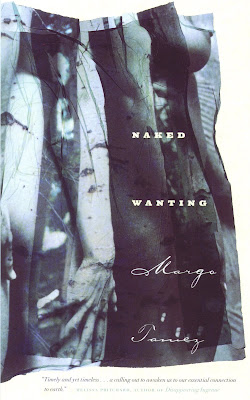

Here's my review of both Naked Wanting and Raven Eye. If you're looking for spun sugar literary confection, and easy comfort, move on. But if you want to encounter poetry that disturbs you in the best possible way, keeps you up at night, demands that you respond with your heart and your mind, read these books.
Margo Tamez is a poet whose work is not easy, clearly born of experience raw and real, making the reader touch that place of pain, of personal wounding far, far, away from the romance of the Southwest and the stereotype of the "stoic noble" on the rez. Her writing forces us to look where the bodies are buried, when we want to turn a blind eye to the violence wreaked upon the individual and environment. Both Naked Wanting and Raven Eye gave me that gnawing feeling in the pit of my stomach, the tight, clenched first buried in the chest. Bless her for that.
And bless her, too, for somehow still weaving threads of redemption and reemergence in the face of soul breaking sorrow, for offering real mythos and confronting false spirituality. But to put a finer point on it, read what others have written about this singular poet.
This book is a challenging cartography of colonialism, poverty, and issues of Native identity and demonstrates these as threats to the environment, both ecological and social, in the borderlands. Each poem is crafted as if it were a minute prayer, dense with compassion and unerring optimism. But the hope that Tamez serves is not blind. In poem after poem, she draws us into a space ruled by mythic symbolism and the ebb and flow of the landscape—a place where comfort is compromised and where we must work to relearn the nature of existence and the value of life. —Norman Dubie
Margo Tamez’s poetry is an emotional journey, and I find myself softly invoking a line from her book: ‘may the way be in peace.’ Read it; you’ll know what I mean! —Simon J. Ortiz
Margo Tamez’s poetry works like a heartsong, it makes us brave. Her alive response to what kills makes us want to stand up with her and sing in the face of the enemy. She shows how hard it is to fight oppression and reminds us what is at stake: living beauty. . . Margo Tamez’s call to battle both instills fear and thrills us. —Heidi E. Erdrich
xxxxxxxxxxxxxxxxxxxxxxxxxxxIn Naked Wanting, Tamez' lens tightly frames the direct links between miscarriages among indigenous women in the Mexico-U.S. borderlands and environmental racism, when damage inflicted on the environment by herbicides comes back to haunt us all at the level of women's reproduction. These are the bombs ticking within these astute and subtle lyrical narratives rendering the pierce of "the chemical cocktail seeping into the air ducts."
This poet speaks as someone who has experienced first-hand the body, literally re-structured by chemical invasions in air, water, soil and food, exposes the consequences and implications when our land and water are compromised.
For Margo Tamez, earth, food, and community are the essentials of life, our deepest wants, beyond human 'rights'--our responsibilities. She brings all of them together in these cautionary and lyrical poems that inspire us to move through compassion and, more concretely, to actions for a more sure footing on earth. Below is a sample that beautifully illustrates just that.
My Mother Returns to Calaboz"The Lower Rio Grande, known as the Seno Mexicano (the Mexican hollow or Recess), was a refuge for rebellious Indians from the Spanish presidios, who preferred outlawry to life under Spanish rule." -- Americo Paredes, With Pistol in his HandThe fragmented jawbones
and comblike teeth of seagulls
sometimes wash up from the gulf
to the levee of the river
and gather straited along the berms
where my grandfather irrigated sugarcane.
My mother, returned after forty years
working away from Calaboz,
walks there often now,
hassled by INS agents
when she jogs by the river
where her ancestors planted, hunted,
prayed and resisted invasions.
The INS think she runs away from them,
that she is an 'illegal', a 'savage'
'trespassing' from Mexico.
Used to the invasion,
she asks them how they assume,
how exactly do they know
if she came from here, or there?
When she tells me this story
she exaggeratedly points to the spot
she stands on (here) and the land
I stand on (there) which means:
you idiot...we indigenous don't recognize
your violent settler borders
I am an an indigenous woman,
born in El Calaboz, you understand?
she says loudly, in mixed Spanish and Lipan-Nahuatl,
and they tear out,
the truck wheels spinning furiously,
sand sprayed into the humid air.
When I was a girl walking on the levee with my grandfather,
I thought I saw gull teeth
chomping at the soil wall.
The air was dank steam,
the scent of sand, roots,
and something alive beneath the soil,
deeper and older than memory.
when I immersed my hand inside
the cloudy water,
it became a fluid form,
soft, something becoming,
something ancient.
The air is still heavy with heat and damp,
and smells like diesel and herbicides.
the scent reminds me of failed gestations.
My reproduction, the plants', and the water's,
each struggling in the same web of resistance
and survival.
When I was a girl, my grandfather taught me
to put a small clump of soil in my mouth,
and to swallow it. I watched him.
Then I did.
I used to watch the gliding and swerves
of uprooted reeds in the river's unhurried flow
to the Gulf.
I reached with all my body,
stomach on the bank of the levee,
hands and arms stretched out like an acrobat
to touch and grasp their slender stems.
Once, my feet pressed into the soupy bog,
and stepping up was heavy, yet with the sound of gurgles,
puckering, a mouth opening,
like seaweed and millennium of soil, my ancestors and water breathing.
Now, I think I'd like to be,
that I will be
running with my mother
when she tells of la migra.
Listen to the bubbling duet of water and plant life,
listen to the sound of grandmothers and grandfathers
closely.
Again and again.
This is a visceral longing for home, for
groundedness in the deepest and most literal sense. It reflects an abiding love for la
tierra, but not the convenient, fantasy laden Southwest. It is a personal, damaged homeland, smelling of chemicals, shot through with run-off that is still somehow, unquestionably sacred.
Tamez writes of border dwellers unbowed, unabsorbed, defiant, and ultimately triumphant---not noble, but stubbornly flawed and human.
xxxxxxxxxxxxxxxxxxxxxxxxxxx
In her second collection,
Raven Eye,
Tamez explores desire and the construction of indigenous identity, while imploring readers to unite against oppression in all its forms.
Written from thirteen years of journals, psychic and earthly, this poetry maps an uprising of a borderland indigenous woman battling forces of racism and sexual violence against Native women and children. This lyric collection breaks new ground, skillfully revealing an unseen narrative of resistance on the Mexico–U.S. border. A powerful blend of the oral and long poem, and speaking into the realm of global movements, these poems explore environmental injustice,
sexualized violence, and indigenous women’s lives.
Ceremony of Peyote
A snakebird sinuous dim form silhouetted
On the porchroof of the hogan--
Comes out of a monsoon sky
Banded thickly red and flint
Snakebird in me curves slowly
Over my bed
the sinew of what can't be said
Nine months full of ocean and yolk
Scents of beautifully made starmatter
A smell of tongue and lip
Of moisture a scent of Snaketown's Gila clay
I'm a brown and black puddle a scent I know
____
You spent hours in the heat of midday fidgeting with rage
I'm unpredictable not the kind of Indian you can present to
Men all wrapped up behind panIndian shawls eagle fans
Who never bring their women to pray
Whose diabetic eyes devour
My pregnant belly
Full of a bird boy raven boy
Ripe with beautiful worlds
Corn meat and berries
You say the order
Morning food for the relatives always like that you say
The look in your eyes don't mess up don't embarrass me
don't talk too long when you pray for the water
Can't risk my prayers to the morning star
Risk what I can say about
This medicine a Mexican Indian woman brought
North got Christianized by subjugated men
My morning prayers only suitable
For waterbirds
Anhingas and herons
Not men or women
In shawls
Fanning and chanting
In chorus of what they deny
My body
The yolks of my body
Stories we must tell to undo
What has been done
There is no easy, pro
forma way to reconnect, no perfect prayer that can be prayed. Colonialism and racism have taken their tolls both in daily life and spiritual practice. But this poem reclaims and
reframes ritual with a frank, and unvarnished fervor.
Tamez refuses to shirk from the distorted in herself, or in her people. But in the boldest move,
Tamez' poetry reveals that Spirit still lives, lives deeply for her in the body, in the process of birth and renewal and in the threads of communion that emerge despite everything.
Naked Wanting ISBN-10: 0816522480
Raven Eye ISBN-10: 081652565X
xxxxxxxxxxxxxxxxxxxxxxxxxxxx
My own words feel pale as I try to end this piece. Let me use last words of her interview last week --
gonya'a' golkizhzhi' (it has come a colorful place)
Margo, For truth's sake, in Her Name, thank you.
xxxxxxxxxxxxxxxxxxxxxxxxxxxxAnd another entry in the "It's so good it bears repeating" department, I was able to attend the
Victor Hernandez Cruz reading last week and lucky enough to be part of a intimate welcoming dinner just before the event, hosted by
Palabra Pura.It was a wonderful experience, with
Francisco Aragón,
Mike Puican,
Mary Hawley and
Ellen Wadey pulling together a salon-like experience for a small group of local poets and writers. Over dinner, we exchanged ideas and met with Victor in a relaxed, vibrant atmosphere. And on a personal note,
Hernández himself could not have been more open and engaging, talking with us about all things poetry, the love of good food, and his time spent between both
Puerto Rico and Morocco.
The crowning glory of the evening was the reading at
HotHouse. Introduced by nationally known writer, Achy
Obejas, we were treated to poetry brimming with musicality, resonant imagery and a lyrical sensibility. In a set that contained both material from the beginning of his career and his new book,
The Mountain in the Sea, Hernández spoke eloquently to issues of
Puerto Rican identity, the Afro Caribbean diaspora and urban culture. Achy also held a brief Q & A for the audience, where a larger group could also connect, discuss, and exchange ideas with a seminal poet and his work. Bravo to
Palabra Pura!
And for those who are unfamiliar, Palabra Pura features Chicano and Latino poets reading work in Spanish, English and a combination of the two languages. The series offers Chicago’s large Spanish-speaking population, the third largest in the United States, a venue to read their poetry as originally composed and helps audiences learn more about the strong tradition of poetry in Spanish. A special emphasis is placed on poets who have recently published books or won recognition for their work.Palabra Pura is a collaborative project between the Guild Complex, Letra Latinas of the Institute for Latino Studies at the University of Notre Dame, the Rafael Cintron-Ortiz Latino Cultural Center at the University of Illinois at Chicago, Arena Cultural and contratiempo. Co-sponsors for this special presentation are The Poetry Foundation and HotHouse, the center for International Performance & Exhibition. This series is partially supported by a grant from the Illinois Humanities Council.And to further entice you,
The Poetry Foundation's website posted an interview conducted by
Francisco Aragón with
Victor Hernández Cruz, plus five poems with commentary by local poets.
Get a glimpse of this spare and evocative poetry:
5 poets comment on 5 Victor
Hernández Cruz poems
http://www.poetryfoundation.org/features/feature.
onpoets.html?id=179552Francisco Aragóninterviews
VHC:
http://www.poetryfoundation.org/features/feature.
onpoets.html?id=179553
Lisa Alvarado

Poetry for the People: A Revolutionary Blueprint
Lauren Muller (ed.)
Poetry Month has got me by the inspiration. Last week I wrote about Poetry Everywhere, and this week I want to profile a book that excites, that teaches, that challenges--Poetry for the People: A Revolutionary Blueprint.
Revolutionary. It's not a word you hear much in conjunction with writing, but I still believe words have the power to change hearts and minds, to change history. Whitman, Sandburg, Frost, Neruda, Rich, Piercy, Giovanni, and Jordan herself have all lived it, breathed it, put the word to paper, and the word became wildfire. We have only to look at recent history to know the White House would rather not have poetry in it. That kind of incendiary truth is more than an inconvenient one.
But beyond the title, why is this book revolutionary? It came out of a series workshops for artistic and political empowerment aimed at students and Oakland area residents, led by June Jordan, under the auspices of the University of California at Berkeley. One need only to read her preface to the syllabus to see that there is a fundamental difference in this work than what is commonly offered in mainstream education. An excerpt here, provides a perfect illustration.
• We reach toward the development of literacy in today's world literature of poetry.
• We divide the course of study evenly, between the scrutiny of published poems and the development of new American poetry to be written by the students themselves.
• We present this new American poetry in public readings open to the entire San Francisco Bay Area. These readings are invariable factors of our coursework.
• We publish student poetry in suitably splendid form, and distribute these anthologies at the student readings and through the kind offices of Berkeley bookstores, such as Black Oak Books and Cody's. This is an integral part of our coursework.
• In conjunction with our course work, we invite one or more visiting poets to present their work....Obviously, our guiding criteria, in addition to the excellence of poetry, is the relentless pursuit of ethnic, racial, gender, and linguistic diversity. (Such poets included: Jimmy Santiago Baca, Marilyn Chin, Thulani Davis, Cornelius Eady, Joy Harjo, Li-Young Li, Donna Masini, Adrienne Rich, Nzotake Shange, among others.)
• All students regardless of academic status (Freshmen to Graduate) are eligible for for enrollment.
On a more basic, and even more fundamentally profound basis, is the the title of the workshop, Poetry for the People, and Jordan's definition of who is constituency.• "The People" shall not be defined as a group excluding or derogating anyone on the basis of race, ethnicity, language, sexual preference, class or age.
• "The People" shall consciously undertake to respect and to encourage each other to feel safe enough to attempt the building of a community of trust in which all may be truthful and deeply serious and the messages they craft, and the world they contemplate.
• Poetry for the People rests upon a belief that the art of telling the truth is a necessary and healthy way to create powerful, and positive connections among people who, would otherwise, remain (Unknown and unaware) strangers. The goal is not to kill connections but, rather, to create and to deepen them among truly different men and women.Once participants were recruited, they met once a week for three hours. Each session starts with an open mic period, during which people try out new work. Then June, a guest speaker, or several student poets lectured a particular poetic genre, history, or tradition. Corresponding to assigned readings, the lectures provided a foundation for in-depth study of different traditions of American poetry---African American, Asian American, Chicano/a, Irish, Native American, women's poetry, and "White" poetry--poetry written by white men established inside 'the canon."This is precisely the direction I needed I for workshops with variety of youth groups here in Chicago. The groups consist of new poets, whose goal was to craft original material to be performed in the schools
and in the community-at-large. I offered a selection of texts, using Jordan's model as a guide. The cross-pollination, the dialogue, the debate that arose with these young writers would have done Ms. Jordan proud. This book is more than a guide, it's a touchstone.Finally, here's my Cliff Notes recommendation for this book. The world needs more chispa words, needs more hearts and minds on fire. Poetry for the People: A Revolutionary Blueprint is eloquent fuel for that. June Jordan's legacy continues to push me, to make me question why I do what I do as a writer and a teacher, and more deeply, as a human being.ISBN-10: 0415911680ISBN-13: 978-0415911689xxxxxxxxxxxxxxxxxxxxxxxxxxxxxxxx
 Other Important News: Do not miss this year's National Latino Writer's Conference, held at the National Hispanic Cultural Center
Other Important News: Do not miss this year's National Latino Writer's Conference, held at the National Hispanic Cultural Center in Albuquerque, NM. http://www.hcfoundation.org/
This three-day conference that takes place May 17-19, 2007, invites all writers published and unpublished, to participate in workshops conducted by nationally and internationally known authors in the genres of poetry, fiction, screenwriting,
playwriting and news writing. Panels of editors and publishers representing such presses as Arte
Público Press, Warner Books, Curbstone Press, Simon and
Schuster, University of New Mexico, Arizona and California Presses and many others will speak on the process of getting your work published. Agents will be available for consultation and interview.
In addition to the aforementioned workshops and panels, there will be an open microphone reading at which time registrants can read from their work to an audience of authors and publishers. A Thursday evening social and Friday night banquet will captivate participants into further discussion and networking.
Presenters Include:OSCAR HIJUELOS [Fiction] was the first Hispano to win the Pulitzer Prize for his second novel, Mambo Kings Play Songs of Love which was made into a movie starring Antonio Banderas and Armand Assante. His novel, Empress of the Splendid Season was published in 1999 and his latest, A Simple Habana Melody was published in 2002.www.answers.com/topic/oscar-hijuelosLORI CARLSON [Youth Literature] is an editor, translator and author of Caña Quemada Burnt Sugar: Contemporary Cuban Poetry, Translations and Originals. Among her other publications are Red Hot Salsa: Bilingual Poems on the Young Latino in the U.S. and The Sunday Tertulia, both published by HarperCollins.www.cbcbooks.org/cbcmagazine/
meet/carlson_lorimarie.htmlBRAULIO MUÑOZ [Fiction] is the author of an award winning novel, The Peruvian Notebooks. He is on the faculty of Swarthmore College and has also published A Storyteller: Mario Vargas Llosa Between Civilization and Barbarism, published by Rowman & Littlefield in 2000. In addition to literary criticism he also has published another work of fiction, Alejandro y los Pescadores de Tancay which was published in Italy in 2004.www.uapress.arizona.edu/BOOKS/bid1708.htmKATHLEEN de AZEVEDO [Fiction] is the author of an award winning novel, Samba Dreams. She is on the faculty of Skyline College and her work has appeared in numerous publications including: Los Angeles Times, Americas, Boston Review, Michigan Quarterly Review, Greensboro Review and many others. Her novel Samba Dreams, "reflects the conflict between the Brazilian and the American culture: the sensual and the pragmatic; the myth of self-determination and the myth of El Dorado."http://labloga.blogspot.com/2006/02/spotlight-on-
kathleen-de-azevedo.htmlPAT MORA [Youth Literature] is a nationally prominent poet/writer. Among her many writing awards, she was the winner of the 2006 NHCC Literary Award and author of Adobe Odes. Her many books of poetry, fiction and children's literature have made her one of the most productive and respected Chicana writers on the literary scene. www.patmora.comBENJAMIN SAENZ [Poetry] is a prolific poet and fiction writer. He is the author of Dreaming the End of War. He is on the faculty of University of Texas, El Paso and his latest book joins his many others. A former roofer, onion picker, janitor, theologian and Catholic priest, Saenz is now a prize winning essayist, novelist, poet and activist passionately in love with El Paso and its peoples. www.benjaminsaenz.com/Pages/
BenHome.html
BEVA SÁNCHEZ-PADILLA [
Playwriting] is a native New Mexican, identifies herself as a literary media and performing artist. Her six produced plays include: La Guadalupe Que
Camina, Mali and Maya: A Story of
Malinche, Letty y
su Mama, Contradictions Split-
Rebozo, and An Altar for Emma. As part of her workshop on
playwriting, she will perform segments from two of these plays.
ALFREDO CORCHADO [News writer] is a renowned investigative journalist with the Dallas Morning News and previously with the Wall Street Journal and the El
Paso Herald-Post. He has won several awards for his coverage of Mexicans in the United States through special projects including: "The
Mexicanization of the United States," and the "Disappearing Border." His reporting led to an internal U.S. inquiry and the removal of heads of the Immigration Customs Enforcement agency. His reporting on drug violence along the border led to the discovery of crimes committed in Texan cities under the order of Mexican drug cartels. Google Alfredo
Corchado + Dallas Morning News and visit http://www.findarticles.com/p/search?tb=art&qt=%22
Alfredo+Corchado%22
YOLANDO NAVA [Marketing] Director of Marketing for NM Monuments of DCA. She is a specialist on writing for marketing and commercial media. Author of It's All in the Frijoles, Nava is an Emmy award-winning broadcast journalist, author and motivational speaker. Her book was winner of the Latino Literary Hall of Fames' 2001 Best Self-help Book Award and was also featured in the Writers Corner of Spirituality.com. Google "Yolanda Nava."
JAVIER GRILLO-MARXUACH [Screenwriting] is a writer for major TV serials like Boomtown, Medium, Lost, Law & Order: Special Victims Unit, Charmed and many others. He also writes his own comics with titles like Super-Skrull which he did for Marvel Comics Mini Series and Middleman, which he did for Viper Comics. He hosts a weekly video show performed entirely by Grillo-Marxuach. New episodes appear on his main website, RadioFreeJavi.com or Google "Javier Grillo-Marxuach."
This three-day conference costs a total of $300.00 including all meals. Previous attendees receive a "founders discount" of $50.00 if you register by February 1st. Travel and lodging will be your responsibility. Participating hotels are listed on the registration form. For more information please call 505.246.2261 x148 or email [email protected].
Take at look at some of the luminaries that will be there, mi gente, Pat Mora, Oscar Hijuelos, Jose Montoya. Don't miss this fantastic event!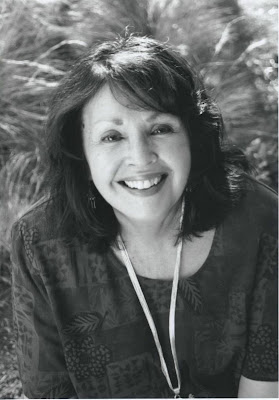

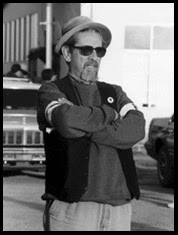
xxxxxxxxxxxxxxxxxxxxxxxxxxxxxxxxxxxxx
Más y más -- from the northern outpost of Aztlán
Palabra Pura
April 3, 2007 – To celebrate National Poetry Month, the Guild Complex’s bilingual reading series,
Palabra Pura, will feature internationally acclaimed poet
Victor Hernández Cruz in a reading on Wednesday, April 18, 2007.
Palabra Pura features Chicano and Latino poets reading work in Spanish, English and a combination of the two languages. The series offers Chicago’s large Spanish-speaking population, the third largest in the United States, a venue to read their poetry as originally composed and helps audiences learn more about the strong tradition of poetry in Spanish. A special emphasis is placed on poets who have recently published books or won recognition for their work.
Exploding onto the poetry scene in the 1970s with a distinctive voice in the Nuyorican school of émigré poetry,
Victor Hernández Cruz probes the grammatical and syntactical conventions within English and Spanish to create his own bilingual idiom. He is the author of numerous poetry collections, most recently
The Mountain in the Sea. He will be introduced by award-winning journalist,
Achy Obejas, who will also lead a question and answer session following the reading.
Palabra Pura is a collaborative project between the Guild Complex, Letra Latinas of the Institute for Latino Studies at the University of Notre Dame, the Rafael Cintron-Ortiz Latino Cultural Center at the University of Illinois at Chicago, Arena Cultural and contratiempo. Co-sponsors for this special presentation are The Poetry Foundation and HotHouse, the center for International Performance & Exhibition. This series is partially supported by a grant from the Illinois Humanities Council.
Held the third Wednesday of every month,
Palabra Pura continues its second year of programming. The
Victor Hernández Cruz reading will be held
Wednesday, April 18 at HotHouse, 31 E. Balbo, Chicago. Doors open at
6:30 p.m. The reading begins at 7:30 p.m.
Admission is free. 18 and over. For more information, please check the Guild Complex website
http://guildcomplex.org, or call 1877.394.50
And to further entice you, The Poetry Foundation's website is posting an interview conducted by
Francisco Aragon with
Victor Hernandez Cruz in the next couple of days. Get a glimpse of his spare and evocative poetry at
http://poetryfoundation.org. Along with the interview will be a selection of five poems with commentary to give you a preview of what will be a
can't miss night of poetry in Chicago.
Lisa Alvarado

Palabra Pura, Chicago's home for cutting edge, innovative Latino poetry is evolving in exciting ways, with its 2008 calendar of stellar talent solidly in place. While still basing itself at the California Clipper, Palabra Pura will begin to also hold events at Latino venues throughout the city. This month, join nationally know poet and performer, Tim Z. Hernandez and Chicago actor, poet and activist, Stephanie Gentry-Fernandez.















You are also muy Divina, my dear Lisa. Thanks for the apodo and for the support for Palabra Pura.
Feliz Año Nuevo!
un abrazo,
Johanny
I plan on being in town for the launch. Looking forward to it.